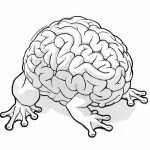I consider myself something of an expert in readability (and specifically health literacy). Yet I was shocked to find that this spring, consumed by Covid stress, I couldn’t read at all. I now have my own experience to help me empathize with readability challenges.
What is Readability?
Can you read? It’s easy to think about reading as binary: you can, or you can’t. But reading – and understanding what you read – should be viewed on a scale. After all, a 1st grader doesn’t read at the same level as an 11th grader. But also, not all 11th graders read at the same level. And once we move beyond school, we certainly don’t all continue to practice our reading.
What’s more, referring to a reading level by grade can be confusing. Does everyone who graduated high school read at a 12th grade reading level? Maybe we do, when we’re in a quiet library with a thesaurus beside them. But what about at the grocery store, distracted and multitasking? What about in the ER, panicked about a family member’s health? What about in the midst of a global pandemic, trying to learn about a complex topic? At those times we find our true “reading level”.
Readability means making information easy to take in. In other words, even though you can technically read anything as long as you can sound out the words, it’s not readable unless you can parse it. If you can read it and then explain what it means, using your own words, then it’s readable. That means that you might read at a 10th grade level if the sentence is about eating scrambled eggs. But perhaps only a 6th grade level if the sentence is about nuclear physics, which is more abstract and complex. This is true for most people.
Case Study: What Could I Read?
On March 12th my family began a doctor’s recommended quarantine to protect an immunocompromised family member. For the first two months, between learning to work completely from home (without a dedicated home office), fear for my health and my family and friends, and the daily stress coming from the headlines, I found that my favorite pastime – reading – was no longer an option. Before Covid I read for an hour or more every day (mostly on my train commute to and from work). I finished a book roughly once a week. Now, I would pick up the same book over and over again, never able to take in the words on the page.
About a month in I finally began to read again. But I had to give up on Orwell’s Homage to Catalonia. I couldn’t take in the information. Instead, I picked up a “guilty pleasure” book: Specter of the Past, a Star Wars book by Timothy Zahn. Why? Well, one reason might be the readability. Readable.io scores Homage to Catalonia as an 11th grade reading level, but Specter of the Past only a 7th grade. (As a note, all grade levels are Flesch-Kincaid Scale.)

After reading a few Star Wars books of similar reading levels, I tried A Tree Grows in Brooklyn, a personal favorite of mine. Unsurprisingly I was immediately able to read this classic – after all, I know it nearly by heart. But is it possible that one reason I always read it in times of crisis is the reading level? The first few pages clock in at a mere 5th grade level!

(It’s interesting to note that both book excerpts have issues: 41 for A Tree Grows in Brooklyn, and 49 for Homage to Catalonia. This is to be expected, as creative writing often breaks the “rules” of writing. Yet clearly the rules being “broken” by A Tree Grows in Brooklyn don’t impact the simplicity of language in the same way Homage to Catalonia does.)
What’s Your User’s Reading Level?
Reading level changes over time. These days, with sunshine outside and more information on the virus, I’m thinking about giving Orwell another chance. But please, use my case study as a reminder: the changes aren’t linear. Our readability is impacted by knowledge, stress, context, and much more. So when you create copy, ask yourself:
- What does my user likely know about this subject?
- When do they need this information (and how do they feel in that moment)?
- Where is my audience (physically) when they tend to look for this information? What is distracting them?
Create your readability level based on much more than education level, and you will have much more readable content.


